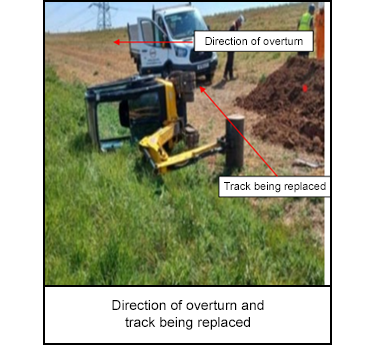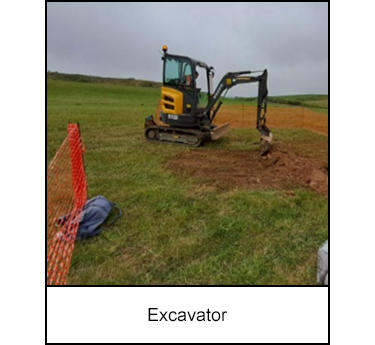-
What happened?
During drainage pit excavation works, a 1.5 tonne (3,360 lbs) excavator’s track became dislodged.
The subcontractor arranged for a hire company technician to attend the site but did not inform the Principal Contractor’s site manager.
The technician attempted to refit the track using a crowbar while the excavator was stationary and unsupervised.
During the repair, the excavator became unstable and tipped over away from the technician, with no injuries reported.

-
Why did it happen?
The excavator was positioned on a gentle slope rather than level ground.
Excessive leverage was applied with a crowbar during track replacement, causing the excavator to lose balance.
Site rules, communication, and permit-to-work procedures were not followed before and during the repair activity.
The subcontractor failed to stop the job and notify the Principal Contractor, preventing proper control and oversight.
Inadequate planning and assessment of ground conditions and equipment suitability led to unsafe working practices.
Lack of supervision and failure to challenge unsafe behaviour allowed the work to proceed outside a safe system of work.

-
What did they learn?
All work was stopped and reported via the 30 minute reporting line and an investigation was initiated. The excavator was righted.
All contractors and subcontractors were briefed on requirements for the management of incidents.
All site requirements have been updated to include the proper excavator and correct ways of righting an overturned machine.

-
Ask yourself or your crew
Has the incident and who is attending been correctly reported to site/task managers?
Is the area safe for excavation work to be done using large machinery? How is this ensured?
Are the correct tools available to complete maintenance? What are they?
Is the correct machine being used for excavation tasks?

Add to homescreen
Content name
Select existing category:
Content name
New collection
Edit collection
What happened?
During drainage pit excavation works, a 1.5 tonne (3,360 lbs) excavator’s track became dislodged.
The subcontractor arranged for a hire company technician to attend the site but did not inform the Principal Contractor’s site manager.
The technician attempted to refit the track using a crowbar while the excavator was stationary and unsupervised.
During the repair, the excavator became unstable and tipped over away from the technician, with no injuries reported.

Why did it happen?
The excavator was positioned on a gentle slope rather than level ground.
Excessive leverage was applied with a crowbar during track replacement, causing the excavator to lose balance.
Site rules, communication, and permit-to-work procedures were not followed before and during the repair activity.
The subcontractor failed to stop the job and notify the Principal Contractor, preventing proper control and oversight.
Inadequate planning and assessment of ground conditions and equipment suitability led to unsafe working practices.
Lack of supervision and failure to challenge unsafe behaviour allowed the work to proceed outside a safe system of work.
What did they learn?
All work was stopped and reported via the 30 minute reporting line and an investigation was initiated. The excavator was righted.
All contractors and subcontractors were briefed on requirements for the management of incidents.
All site requirements have been updated to include the proper excavator and correct ways of righting an overturned machine.

Ask yourself or your crew
Has the incident and who is attending been correctly reported to site/task managers?
Is the area safe for excavation work to be done using large machinery? How is this ensured?
Are the correct tools available to complete maintenance? What are they?
Is the correct machine being used for excavation tasks?
An excavator tipped over during track repair on a slope; it fell away from the technician but no injuries were reported.











